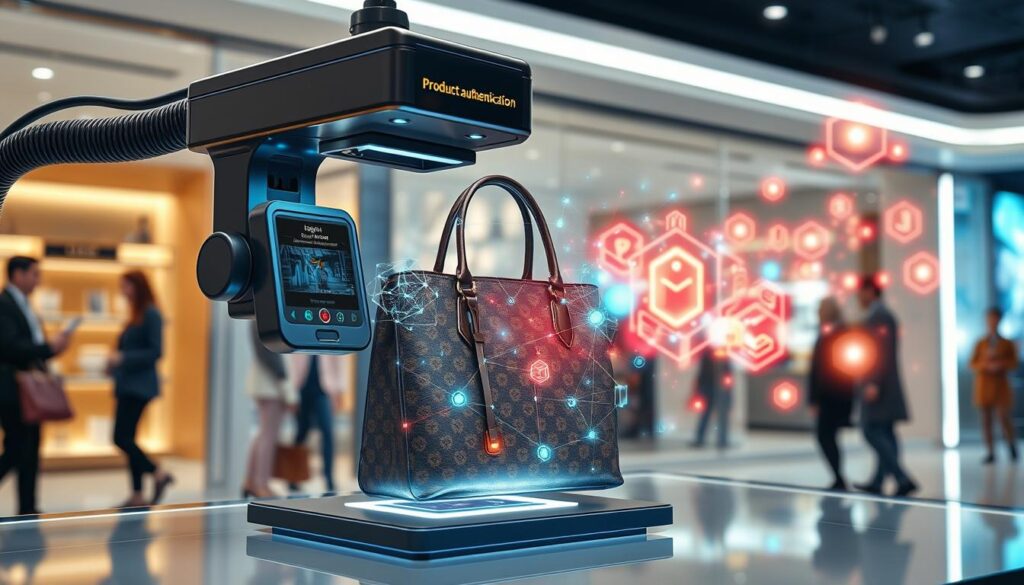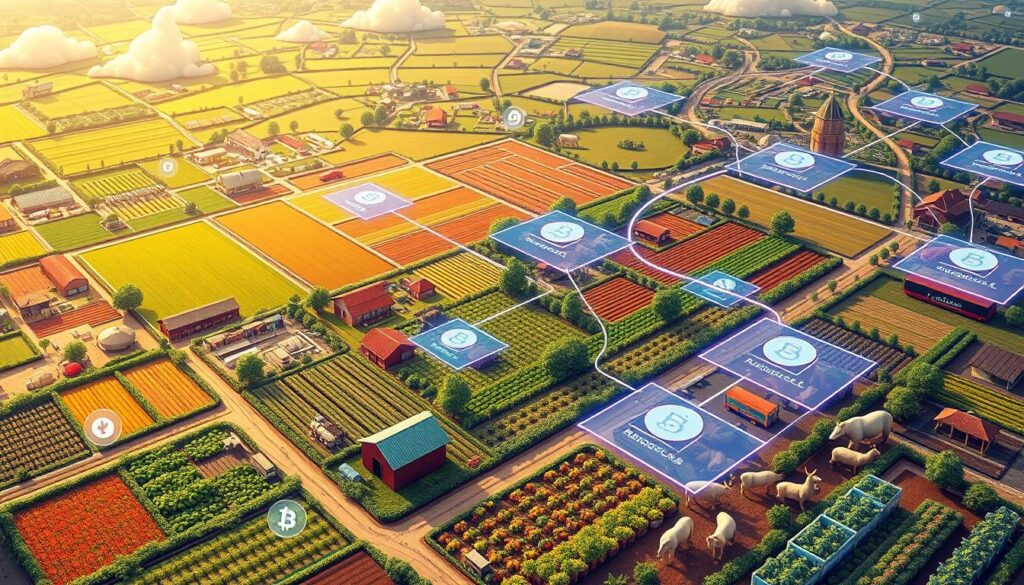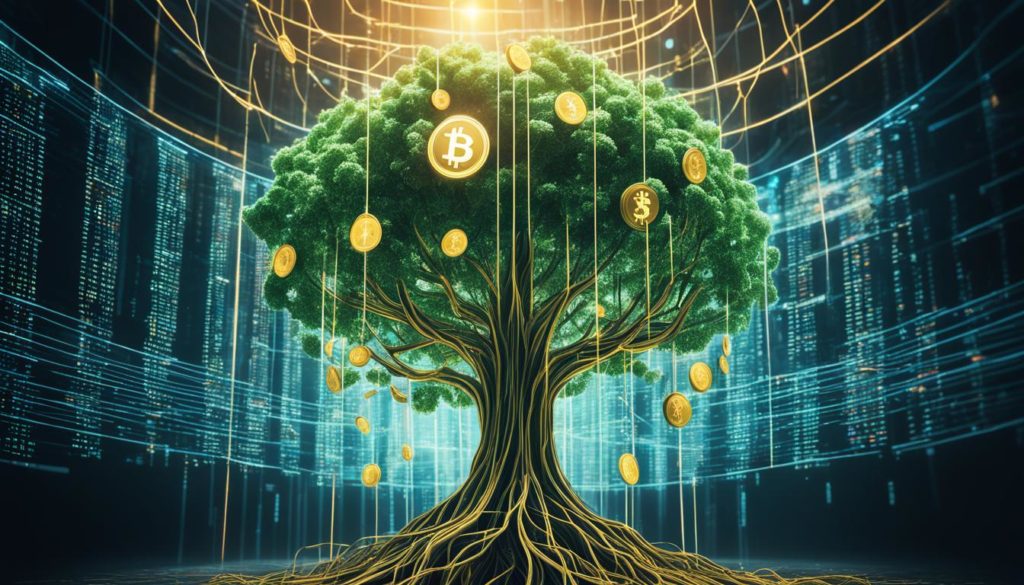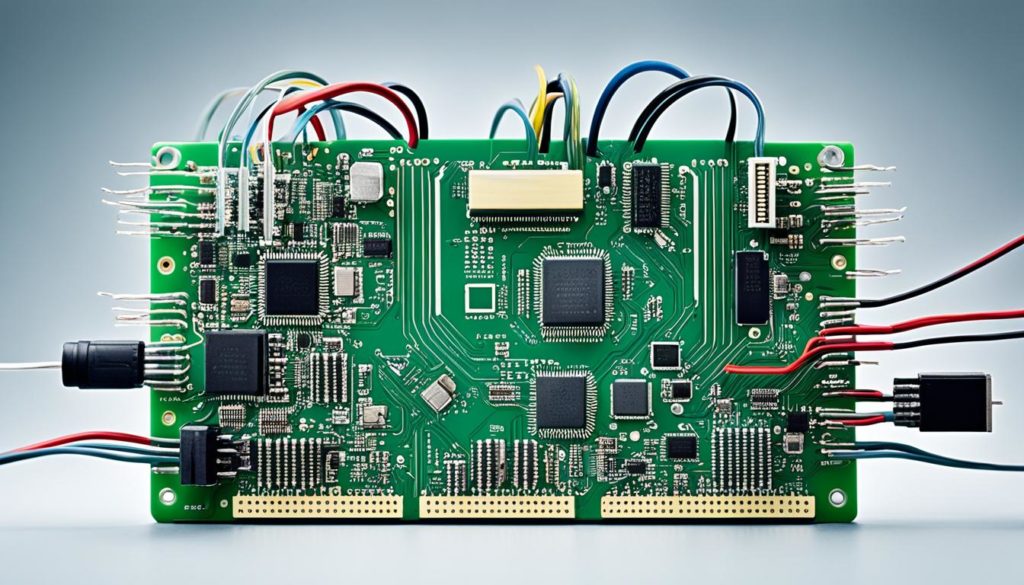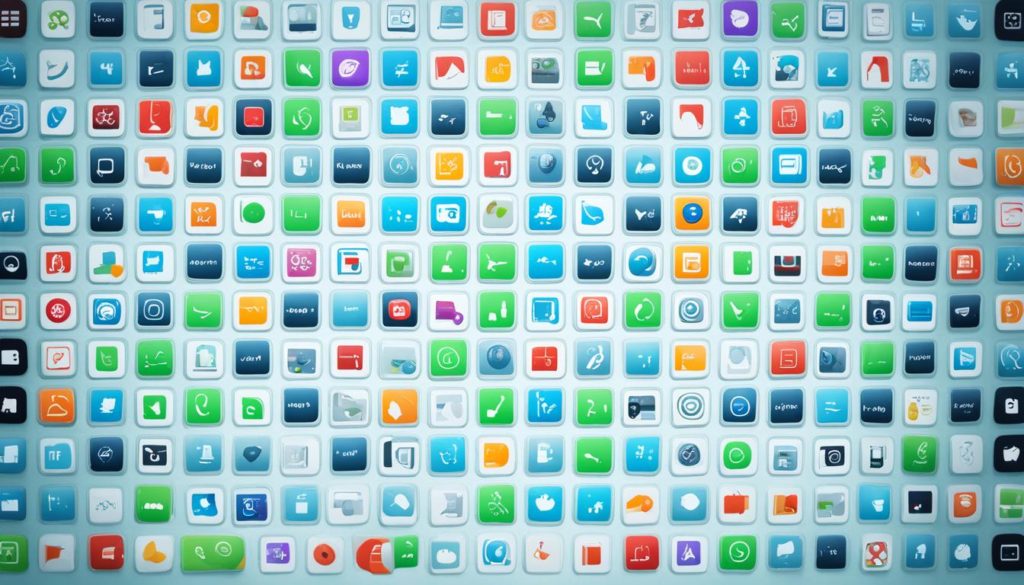
In 2023, the US Customs and Border Patrol seized over $1.5 billion in counterfeit items. This shows how important it is to have technologies that boost transparency and security. Blockchain technology is a decentralized ledger known for its strong security and clear transparency. It’s changing how we do transactions, use smart contracts, and manage supply chains.
Blockchain is a decentralized database that’s secure and can’t be tampered with. It’s accessible to many parties, building trust and cutting out middlemen. The impact of blockchain is seen in many areas. For example, Aura Blockchain Consortium is fighting counterfeiting in luxury goods with “Digital Product Passports.”
They partnered with Dior to launch the B33 sneaker. This sneaker lets buyers track its journey from making to buying.
Blockchain’s influence goes beyond luxury goods. In farming, companies like Dimitra use it to help farmers grow more, save money, and be transparent to buyers. Blockchain also changes financial services, making transactions fast, secure, and cheap. It cuts out the need for middlemen.
Blockchain’s benefits are clear and far-reaching. It improves supply chain management and changes financial transactions for the better.
Key Takeaways
- Blockchain technology is already fighting counterfeiting, with the US Customs and Border Patrol seizing $1.5 billion worth of items.
- Aura Blockchain Consortium has made big steps with “Digital Product Passports” in luxury goods.
- Dimitra uses blockchain to make farming more transparent and efficient.
- Blockchain offers secure and affordable financial transactions, removing the need for middlemen.
- Adopting blockchain early makes companies leaders in markets that value transparency and authenticity.
Introduction to Blockchain Technology
Blockchain technology was introduced in 2008 by Satoshi Nakamoto. It’s the foundation of cryptocurrencies like Bitcoin and Ethereum. This tech uses a distributed database for secure and transparent transactions, without a central server.
Each transaction is stored in a digital ledger and shared across the network. This makes it hard to alter historical records.
Blockchain’s decentralized nature makes it trustworthy. Data is spread over millions of computers worldwide, known as nodes. These nodes check and share transactions, keeping the blockchain secure.
Blockchain goes beyond just cryptocurrencies. It’s changing industries like healthcare, supply chain, digital identity, and finance. Companies like Visa, Walmart, and Pfizer are using it to improve operations and security.
Big tech names like Google, Amazon, and IBM are also investing in blockchain development. This shows its wide appeal and potential.
Blockchain offers many benefits. It saves time, cuts costs, and boosts reliability. Its transparent and unchangeable ledger builds trust among users. This is especially useful in fighting counterfeits, improving supply chains, and protecting data in finance and airlines.
The future of blockchain looks bright. It could change finance, supply chains, and the Internet of Things (IoT). Even governments, like Dubai, are looking into blockchain for public records. As it grows, blockchain will bring new solutions to many sectors.
We can explore blockchain’s role further by comparing its types:
| Type of Blockchain | Description | Examples |
|---|---|---|
| Public Blockchain | Open to anyone for transactions and participation in the consensus process. | Bitcoin, Ethereum |
| Private Blockchain | Governed by one organization, offering decentralized peer-to-peer networks with controlled participation. | Hyperledger Fabric, R3 Corda |
| Permissioned Blockchain | Restrictions on who can participate, requiring permission to join the network. | Ripple, Quorum |
| Consortium Blockchain | Maintained by multiple organizations with preselected participants controlling the network. | IBM Food Trust, Marco Polo |
Blockchain’s distributed database ensures high security, decentralization, and transparency. It’s perfect for many modern uses. With ongoing improvements and adoption, blockchain is set to change how we manage and secure data online.
Blockchain’s Role in Combating Counterfeit Goods
Counterfeit goods are a big problem worldwide. They cost the global economy billions of dollars every year. This affects many industries, from fashion to medicine. But, blockchain technology is a new hope to fight this issue by making products more authentic.
Blockchain makes the whole supply chain clear, helping to find and stop fake goods. Brands like Louis Vuitton and Gucci use it to prove their products are real. This builds trust with customers and helps brands sell more.
Using blockchain IDs in products makes checking if they’re real easy. Apps or QR codes can verify this quickly. These records can’t be changed, keeping the supply chain safe.
Blockchain also tracks products from start to finish. This is great for medicines, where it stops fake drugs from getting to people. It makes markets safer and more reliable for everyone.
Even though there are challenges like growing too fast or working with different systems, blockchain’s benefits are clear. Working together, we can use blockchain to fight fake goods.
To learn more about blockchain fighting fake goods, check out this article.
Blockchain helps keep products real and builds trust. It’s not just good for brands; it helps the whole market grow. It’s a big step forward for global trade.
Blockchain Advancements in the Agriculture Industry
Blockchain technology is changing the agriculture industry. It makes supply chain transparency better and supports sustainable farming. In 2022, the market for blockchain in agriculture was worth USD 285.34 million. It’s expected to grow to USD 7378.68 million by 2031, showing blockchain’s big impact.
Blockchain helps by cutting out middlemen and making payments fair for farmers. It gives farmers more control over prices and helps them sell globally. This way, farmers get more money and access to markets.
Blockchain also helps reduce food waste by making it easier to track food. It uses smart contracts to encourage farming that’s good for the planet. This makes farming more efficient and sustainable.
Blockchain empowers farmers by giving them market information. This lets farmers negotiate better prices. It also helps preserve genetic material and track carbon emissions accurately.
Blockchain has made 84% of farmers better at making decisions. Mobile phones have made it easier for farmers to get market information. This has led to more farmers selling their products.
Blockchain makes data trustworthy by using a special protocol. This reduces data tampering by 95%. It also makes transactions cheaper and data more reliable.
Blockchain-based insurance has made index-based insurance 50% more efficient. It uses data like rainfall to pay farmers accurately and on time. This reduces risks and makes insurance better.
In summary, blockchain is changing agriculture. It makes farming more transparent, sustainable, and accessible. As the industry grows, blockchain will be key to its future.
Revolutionizing Financial Services with Blockchain Technology
Blockchain technology has changed the financial world a lot. It brings many benefits, like better security and clearness. It makes transactions hard to tamper with and fraud-proof.
Digital currencies like Bitcoin and Ethereum show how secure and decentralized transactions can be. They reduce the risks of old financial systems.
Blockchain makes cross-border payments faster and cheaper. It cuts out middlemen, making transactions quick and cheap. Ripple is a great example, making payments fast and low-cost.
Smart contracts are another big change. They automate and enforce agreements without needing middlemen. This cuts costs and boosts efficiency.
Smart contracts are used in asset management and insurance. They help with faster payouts and lower costs. Blockchain also makes supply chain finance better, tracking goods and payments clearly.
Asset tokenization on blockchain is a big step forward. It allows for partial ownership and more liquidity. This opens up investment to more people.
The market for blockchain in banking is expected to grow a lot. It’s set to jump from $7.4 billion in 2022 to $94.0 billion by 2027. Blockchain’s role in making finance safer and clearer will only get stronger as it evolves.
FAQ
What is blockchain technology?
Blockchain is a system that keeps data safe and unchangeable. It’s used for things like Bitcoin and Ethereum. It makes sure all transactions are clear and can’t be altered.
How does blockchain enhance security?
Blockchain makes transactions safe by encrypting them and linking them together. This creates a chain that can’t be changed. It’s like a digital safe that keeps records secure.
What are smart contracts?
Smart contracts are digital agreements that run on their own. They have rules written in code. This means they can work without needing someone to oversee them, making things more efficient.
How is blockchain technology used in the agriculture industry?
In farming, blockchain helps track food from the farm to your plate. It makes sure the food is real and safe. This builds trust between farmers and consumers.
What are some notable blockchain applications?
Blockchain is used in many areas. It helps keep health records safe, tracks goods in supply chains, and verifies identities. It makes things more secure and trustworthy.
How does blockchain support cryptocurrency?
Blockchain helps cryptocurrencies by keeping a record of all transactions. This makes sure everything is safe and can’t be changed. It’s like a digital ledger that keeps track of money.
What are the future regulatory implications for blockchain?
As blockchain grows, rules are being made to support it. These rules aim to keep things safe and fair. They will help blockchain become more widely used.
How can blockchain technology combat counterfeit goods?
Blockchain fights fake goods by tracking them. It makes sure products are real. This helps consumers and businesses know what they’re buying.
What impact can blockchain have on financial services?
Blockchain changes finance by making it safer and clearer. It cuts out middlemen, lowers costs, and speeds up transactions. It makes money moves more secure and efficient.
Future App Studios is an award-winning software development & outsourcing company. Our team of experts is ready to craft the solution your company needs.


